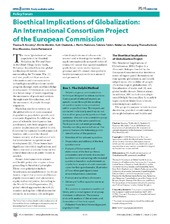| dc.contributor.author | Novotny, Thomas E. | eng |
| dc.contributor.author | Mordini, Emilio | eng |
| dc.contributor.author | Chadwick, Ruth | eng |
| dc.contributor.author | Pedersen, J. Martin | eng |
| dc.contributor.author | Fabbri, Fabrizio | eng |
| dc.contributor.author | Lie, Reidar K. | eng |
| dc.contributor.author | Thanachaiboot, Natapong | eng |
| dc.contributor.author | Mossialos, Elias | eng |
| dc.contributor.author | Permanand, Govin | eng |
| dc.date.accessioned | 2006-11-30T09:41:43Z | |
| dc.date.available | 2006-11-30T09:41:43Z | |
| dc.date.issued | 2006-01-24 | eng |
| dc.Published | PLoS Medicine 3(2): e43 | |
| dc.identifier.issn | 1549-1676 | |
| dc.identifier.uri | https://hdl.handle.net/1956/1993 | |
| dc.description.abstract | The term “globalization” was popularized by Marshall McLuhan in War and Peace in the Global Village. In the book, McLuhan described how the global media shaped current events surrounding the Vietnam War [1] and also predicted how modern information and communication technologies would accelerate world progress through trade and knowledge development. Globalization now refers to a broad range of issues regarding the movement of goods and services through trade liberalization, and the movement of people through migration. Much has also been written on the global effects of environmental degradation, population growth, and economic disparities. In addition, the pace of scientific development has accelerated, with both negative and positive implications for global health. Concerns for national health transcend borders, with a need for shared human security and an enhanced role for international cooperation and development [2]. These issues have significant bioethical implications, and thus a renewed academic focus on the ethical dimensions of public health is needed. Future developments in science and health policy also require a firm grounding in bioethical principles. These core principles include beneficence; nonmaleficence (to do no harm); respect for persons and human dignity (autonomy); and attention to equity and social justice. According to the World Health Organization [3], global ethical approaches should (1) monitor and update ethical norms for research, as necessary; (2) anticipate ethical implications of advances in science and technology for health; (3) apply internationally accepted codes of ethics; (4) ensure that agreed standards guide future work on the human genome; and (5) ensure that quality in health systems and services is assessed and promoted. | en_US |
| dc.format.extent | 125815 bytes | eng |
| dc.format.mimetype | application/pdf | eng |
| dc.language.iso | eng | eng |
| dc.publisher | Public Library of Science | eng |
| dc.title | Bioethical Implications of Globalization: An International Consortium Project of the European Commission | eng |
| dc.type | Peer reviewed | |
| dc.type | Journal article | |
| dc.description.version | publishedVersion | |
| dc.rights.holder | Copyright 2006 Novotny et al. This is an open-access article distributed under the terms of the Creative Commons Attribution License, which permits unrestricted use, distribution, and reproduction in any medium, provided the original author and source are credited. | |
| dc.identifier.doi | https://doi.org/10.1371/journal.pmed.0030043 | |
| dc.subject.nsi | VDP::Humaniora: 000::Filosofiske fag: 160::Filosofi: 161 | |
| dc.subject.nsi | VDP::Medisinske Fag: 700::Helsefag: 800 | |
